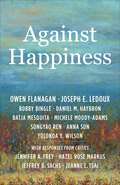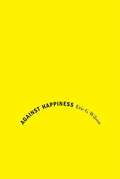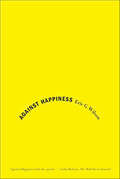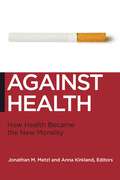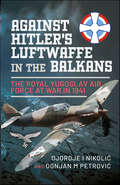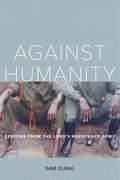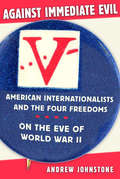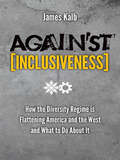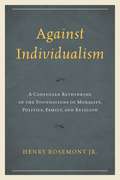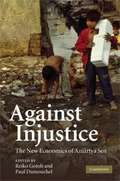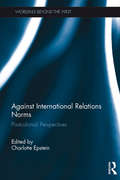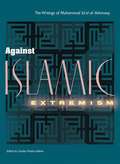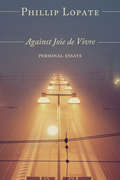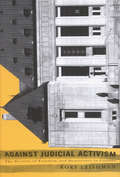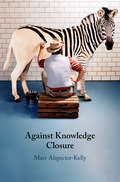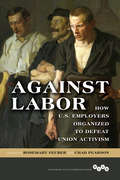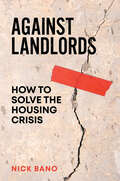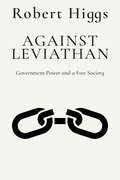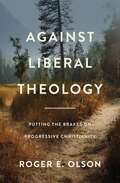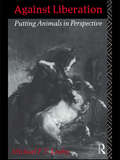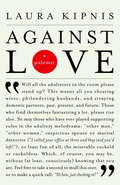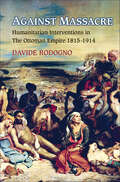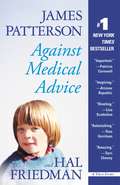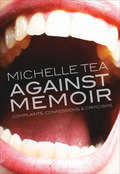- Table View
- List View
Against Happiness
by Owen Flanagan Batja Mesquita Anna Sun Joseph E. LeDoux Daniel M. Haybron Michele Moody-Adams Bobby Bingle Songyao Ren Yolonda Y. WilsonThe “happiness agenda” is a worldwide movement that claims that happiness is the highest good, happiness can be measured, and public policy should promote happiness. Against Happiness is a thorough and powerful critique of this program, revealing the flaws of its concept of happiness and advocating a renewed focus on equality and justice.Written by an interdisciplinary team of authors, this book provides both theoretical and empirical analysis of the limitations of the happiness agenda. The authors emphasize that this movement draws on a parochial, Western-centric philosophical basis and demographic sample. They show that happiness defined as subjective satisfaction or a surplus of positive emotions bears little resemblance to the richer and more nuanced concepts of the good life found in many world traditions. Cross-cultural philosophy, comparative theology, and social and cultural psychology all teach that cultures and subcultures vary in how much value they place on life satisfaction or feeling happy. Furthermore, the ideas promoted by the happiness agenda can compete with rights, justice, sustainability, and equality—and even conceal racial and gender injustice.Against Happiness argues that a better way forward requires integration of cross-cultural philosophical, ethical, and political thought with critical social science. Ultimately, the authors contend, happiness should be a secondary goal—worth pursuing only if it is contingent on the demands of justice.
Against Happiness: In Praise of Melancholy
by Eric G. WilsonIn Against Happiness, the scholar Eric G. Wilson argues that melancholia is necessary to any thriving culture, that it is the muse of great literature, painting, music, and innovation and that it is the force underlying original insights and suggests it would be better to relish the blues that make humans people.
Against Happiness: In Praise of Melancholy
by Eric G. WilsonAmericans are addicted to happiness. When we're not popping pills, we leaf through scientific studies that take for granted our quest for happiness, or read self-help books by everyone from armchair philosophers and clinical psychologists to the Dalai Lama on how to achieve a trouble-free life: Stumbling on Happiness; Authentic Happiness: Using the New Positive Psychology to Realize Your Potential for Lasting Fulfillment; The Art of Happiness: A Handbook for Living. The titles themselves draw a stark portrait of the war on melancholy. More than any other generation, Americans of today believe in the transformative power of positive thinking. But who says we're supposed to be happy? Where does it say that in the Bible, or in the Constitution? In Against Happiness, the scholar Eric G. Wilson argues that melancholia is necessary to any thriving culture, that it is the muse of great literature, painting, music, and innovation—and that it is the force underlying original insights. Francisco Goya, Emily Dickinson, Marcel Proust, and Abraham Lincoln were all confirmed melancholics. So enough Prozac-ing of our brains. Let's embrace our depressive sides as the wellspring of creativity. What most people take for contentment, Wilson argues, is living death, and what the majority takes for depression is a vital force. In Against Happiness: In Praise of Melancholy, Wilson suggests it would be better to relish the blues that make humans people.
Against Health: How Health Became the New Morality (Biopolitics #18)
by Anna Kirkland Jonathan M. MetzlNavigates the divergent cultural meanings of health, and its entanglement with morality in current political discourseYou see someone smoking a cigarette and say,“Smoking is bad for your health,” when what you mean is, “You are a bad person because you smoke.” You encounter someone whose body size you deem excessive, and say, “Obesity is bad for your health,” when what you mean is, “You are lazy, unsightly, or weak of will.” You see a woman bottle-feeding an infant and say,“Breastfeeding is better for that child’s health,” when what you mean is that the woman must be a bad parent. You see the smokers, the overeaters, the bottle-feeders, and affirm your own health in the process. In these and countless other instances, the perception of your own health depends in part on your value judgments about others, and appealing to health allows for a set of moral assumptions to fly stealthily under the radar.Against Health argues that health is a concept, a norm, and a set of bodily practices whose ideological work is often rendered invisible by the assumption that it is a monolithic, universal good. And, that disparities in the incidence and prevalence of disease are closely linked to disparities in income and social support. To be clear, the book's stand against health is not a stand against the authenticity of people's attempts to ward off suffering. Against Health instead claims that individual strivings for health are, in some instances, rendered more difficult by the ways in which health is culturally configured and socially sustained.The book intervenes into current political debates about health in two ways. First, Against Health compellingly unpacks the divergent cultural meanings of health and explores the ideologies involved in its construction. Second, the authors present strategies for moving forward. They ask, what new possibilities and alliances arise? What new forms of activism or coalition can we create? What are our prospects for well-being? In short, what have we got if we ain't got health? Against Health ultimately argues that the conversations doctors, patients, politicians, activists, consumers, and policymakers have about health are enriched by recognizing that, when talking about health, they are not all talking about the same thing. And, that articulating the disparate valences of “health” can lead to deeper, more productive, and indeed more healthy interactions about our bodies.
Against Her Will
by Ronald J. WatkinsRichard and Victoria Tinyes feared the worst when their thirteen-year-old daughter Kelly Ann vanished from their quiet suburban community of Valley Stream, New York on March 3, 1989. But the nightmare to come was worse than they could ever imagine. Only five doors away, in the home of John and Elizabeth Golub, police found Kelly Ann's body stuffed in a plastic garbage bag. She'd been brutally beaten, stabbed, strangled and mutilated. After weeks of intense investigation, police arrested the Golubs' twenty-one-year--old son. Robert--a reclusive young man obsessed with bodybuilding and given to fits of rage. The sensational trial and subsequent conviction of Robert Golub shocked the nation and tore the once-peaceful community apart. Neighbors took sides. So did the media. And no one who lived on Horton Road would ever be the same.
Against Hitler's Luftwaffe in the Balkans: The Royal Yugoslav Air Force at War in 1941
by Djordje I. Nikolic Ognjan M. Petrovic“The extraordinary photographs of aircraft, personnel, and facilities set this book apart.” -The Journal of the Air Force Historical Foundation Immediately following the end of the First World War, the air force of the newly-formed Southern Slav State, the Kingdom of Serbs, Croats and Slovenes, was forced to rely mainly on war-time Serbian Air Service aircraft and material left after the withdrawal of the French Armée de l’Air from the Balkans in 1919/1920. This equipment was supported by the addition of French war surplus stocks which started arriving in 1921. In 1929 the monarchy changed its name to the Kingdom of Yugoslavia. Then, from 1930, the official name of the air service branch its military was changed to what is commonly known in the West as the Royal Yugoslav Air Force (RYAF). The obsolete First World War aircraft were replaced from 1925 onwards by stop-gap solutions purchased mainly from France, some from the Czechoslovakian Republic as well as from the first domestic factories. From 1936, the RYAF again began to reorganize and modernize, with the purchase of the most modern aircraft available at that time. These aircraft were imported from the UK, Germany and Italy, some being built under license in domestic factories. During this period the Kingdom of Yugoslavia succeeded, as much as conditions allowed, to equip its air force with the most advanced fighter and bomber types of the period. For the Kingdom of Yugoslavia, the Second World War started on 6 April 1941. The military coup d’etat of 27 March 1941 and anti-German demonstrations in Belgrade clearly aligned the kingdom with the Allies. That same day, Hitler ordered the implementation of Unternehmen 25 (Operation 25) – the attack against Kingdom of Yugoslavia. Hitler had also secured Mussolini’s support for this campaign, while Hungary, Romania and Bulgaria gave active or passive backing in exchange for territorial claims in Yugoslavia. Despite all the odds, the airmen of the RYAF fought gallantly in the defense of their homeland, with fighters taking on the German and Italian bombers and their escort fighters – including the Axis types in service with the RYAF. Eventually, due to the deteriorating situation on the front and the ever-increasing risk of the king and his government being captured, the decision was taken to evacuate by air to Greece. In the summer of the 1941 some 220 Yugoslav aviators gathered in Egypt and continued the fight against Axis, this time in the colors of the RAF. This is the full story of their service and combats in the early months of that year.
Against Humanity: Lessons from the Lord's Resistance Army
by Sam Dubal“Gunya is a woman in her late twenties. Soldiers of the Lord’s Resistance Army (LRA) abducted her when she was eleven years old and forcefully conscripted her into the rebel ranks. Gunya spent a little over a decade with the rebels before deserting. While there, she gave birth to a son with Onen, an LRA soldier. Though abducted, she expresses her continued support for the LRA and their tactics, admitting that she sometimes thinks of going back to the lum [bush] when life becomes hard as a civilian at home.” This is not a book about crimes against humanity. Rather, it is an indictment of the very idea of humanity, the concept that lies at the heart of human rights and humanitarian missions. Based on fieldwork in northern Uganda, anthropologist and medical doctor Sam Dubal brings readers into the inner circle of the Lord’s Resistance Army, an insurgent group accused of rape, forced conscription of children, and inhumane acts of violence. Dubal speaks with former LRA rebels as they find personal meaning in wartime violence, politics, and spirituality—experiences that observers often place outside of humanity’s boundaries. What emerges is an unorthodox and provocative question: What would it mean to be truly against humanity? And how does one honor life existing outside hegemonic notions of the good?
Against Immediate Evil: American Internationalists and the Four Freedoms on the Eve of World War II
by Andrew JohnstoneIn Against Immediate Evil, Andrew Johnstone tells the story of how internationalist Americans worked between 1938 and 1941 to convince the U.S. government and the American public of the need to stem the rising global tide of fascist aggression. As war approached, the internationalist movement attempted to arouse the nation in order to defeat noninterventionism at home and fascism overseas. Johnstone's examination of this movement undermines the common belief that the Japanese attack on Pearl Harbor wrenched an isolationist United States into global armed conflict and the struggle for international power. Johnstone focuses on three organizations—the American Committee for Non-Participation in Japanese Aggression, the Committee to Defend America by Aiding the Allies, and Fight For Freedom—that actively promoted a more global role for the United States based on a conception of the "four freedoms" later made famous by FDR. The desire to be free from fear was seen in concerns regarding America’s immediate national security. The desire to be free from want was expressed in anxieties over the nation’s future economic prosperity. The need for freedom of speech was represented in concerns over the potential loss of political freedoms. Finally, the need for freedom of worship was seen in the emphasis on religious freedoms and broader fears about the future of Western civilization. These groups and their supporters among the public and within the government characterized the growing global conflict as one between two distinct worlds and in doing so, set the tone of American foreign policy for decades to come.
Against Inclusiveness: How the Diversity Regime is Flattening America and the West and What to Do About It
by James KalbDiversity. Inclusiveness. Equality.--ubiquitous words in 21st-century political and social life. But how do those who police the limits of acceptable discourse employ these as verbal weapons to browbeat their often hapless fellows into having a "real conversation"? How do these terms function as mere doublespeak for the expectation of full-scale capitulation to the views of "right-thinking people"? Those who have long been afraid to touch the issues that attend these words will take great reassurance in an articulate statement of the kind presented in Against Inclusiveness, where the author's approach is sober and extremely well reasoned, as he attempts to marshal truth and fairness as criteria in the examination of issues critical to modern social life. Kalb argues that in current inclusiveness ideology, "classifying people" becomes an exercise of power by the classifier that denies the dignity of the person classified. All rational consideration of human reality is thereby suspended, and the result is something arbitrary and increasingly tyrannical. Against Inclusiveness lays the foundation for what an honest, forthright, real conversation on these matters might look like.
Against Individualism: A Confucian Rethinking of the Foundations of Morality, Politics, Family, and Religion
by Henry RosemontThe first part of Against Individualism: A Confucian Rethinking of the Foundations of Morality, Politics, Family, and Religion is devoted to showing how and why the vision of human beings as free, independent and autonomous individuals is and always was a mirage that has served liberatory functions in the past, but has now become pernicious for even thinking clearly about, much less achieving social and economic justice, maintaining democracy, or addressing the manifold environmental and other problems facing the world today. In the second and larger part of the book Rosemont proffers a different vision of being human gleaned from the texts of classical Confucianism, namely, that we are first and foremost interrelated and thus interdependent persons whose uniqueness lies in the multiplicity of roles we each live throughout our lives. This leads to an ethics based on those mutual roles in sharp contrast to individualist moralities, but which nevertheless reflect the facts of our everyday lives very well. The book concludes by exploring briefly a number of implications of this vision for thinking differently about politics, family life, justice, and the development of a human-centered authentic religiousness. This book will be of value to all students and scholars of philosophy, political theory, and Religious, Chinese, and Family Studies, as well as everyone interested in the intersection of morality with their everyday and public lives.
Against Injustice: The New Economics of Amartya Sen
by Reiko Gotoh Paul DumouchelTraditional theories of justice as formulated by political philosophers, jurists and economists have all tended to see injustice as simply a breach of justice, a breakdown of the normal order. Amartya Sen's work acts as a corrective to this tradition by arguing that we can recognise patent injustices, and come to a reasoned agreement about the need to remedy them, without reference to an explicit theory of justice. Against Injustice brings together distinguished academics from a variety of different fields - including economics, law, philosophy and anthropology - to explore the ideas underlying Sen's critique of traditional approaches to injustice. The centrepiece of the book is the first chapter by Sen in which he outlines his conception of the relationship between economics, ethics and law. The rest of the book addresses a variety of theoretical and empirical issues that relate to this conception, concluding with a response from Sen to his critics.
Against International Relations Norms: Postcolonial Perspectives (Worlding Beyond the West)
by Charlotte EpsteinThis volume uses the concept of ‘norms’ to initiate a long overdue conversation between the constructivist and postcolonial scholarships on how to appraise the ordering processes of international politics. Drawing together insights from a broad range of scholars, it evaluates what it means to theorise international politics from a postcolonial perspective, understood not as a unified body of thought or a new ‘-ism’ for IR, but as a ‘situated perspective’ offering ex-centred, post-Eurocentric sites for practices of situated critique. Through in-depth engagements with the norms constructivist scholarship, the contributors expose the theoretical, epistemological and practical erasures that have been implicitly effected by the uncritical adoption of ‘norms’ as the dominant lens for analysing the ideational dynamics of international politics. They show how these are often the very erasures that sustained the workings of colonisation in the first place, whose uneven power relations are thereby further sustained by the study of international politics. The volume makes the case for shifting from a static analysis of ‘norms’ to a dynamic and deeply historical understanding of the drawing of the initial line between the ‘normal’ and the ‘abnormal’ that served to exclude from focus the 'strange' and the unfamiliar that were necessarily brought into play in the encounters between the West and the rest of the world. A timely intervention, it will be of great interest to students and scholars of international relations, international relations theory and postcolonial scholarship.
Against Islamic Extremism: The Writings Of Muhammad Sa'id Al-'ashmawy
by Carolyn Fluehr-LobbanOne of the Islamic world's leading voices in the struggle against extremism, Sa'id al-'Ashmawy was trained as a specialist in Islamic law and comparative law at Cairo University and served as judge, chief prosecutor, chief justice of the High Criminal Court, chief justice of the High Court for Security of State as well as chief justice of the High Court Assizes in Egypt. The author of 15 books on Islam and the law, he has been consistently critical of Islamic extremism and opposes the very notion of an Islamic state, on both scriptural and historical grounds. <p><p> Facing death threats for apostasy since 1979 and under continuous government protection since 1980, he articulates an opposition to the ideology and practice of Islamic extremists in Egypt that has applicability throughout the Middle East and North Africa. This volume conveys the range of his reformist message from the similarities of Islam, Judaism, and Christianity, to the dangers of politicizing Islamic religion, to the place of Islamic law in contemporary politics and society.
Against Joie de Vivre
by Phillip Lopate“Over the years I have developed a distaste for the spectacle of joie de vivre, the knack of knowing how to live,” begins the title essay by Phillip Lopate. This rejoinder to the cult of hedonism and forced conviviality moves from a critique of the false sentimentalization of children and the elderly to a sardonic look at the social rite of the dinner party, on to a moving personal testament to the “hungry soul. ” Lopate’s special gift is his ability to give us not only sophisticated cultural commentary in a dazzling collection of essays but also to bring to his subjects an engaging honesty and openness that invite us to experience the world along with him. Also included here are Lopate’s inspiring account of his production of Chekhov’s Uncle Vanya with a group of preadolescents, a look at the tradition of the personal essay, and a soul-searching piece on the suicide of a schoolteacher and its effect on his students and fellow teachers. By turns humorous, learned, celebratory, and elegiac, Lopate displays a keen intelligence and a flair for language that turn bits of common, everyday life into resonant narrative. This collection maintains a conversational charm while taking the contemporary personal essay to a new level of complexity and candor.
Against Judicial Activism
by Rory LeishmanAgainst Judicial Activism cites numerous cases to support this argument. For instance, the British Columbia Human Rights Tribunal and Supreme Court read a ban on discrimination on the ground of transsexualism as being part of the province's human rights code. On the basis of this revision of the law, the tribunal ordered the Vancouver Rape Relief Society to pay $7,500 to a transsexual man in compensation for refusing to admit him into a training course for rape crisis counsellors.
Against Knowledge Closure
by Marc Alspector-KellyKnowledge closure is the claim that, if an agent S knows P, recognizes that P implies Q, and believes Q because it is implied by P, then S knows Q. Closure is a pivotal epistemological principle that is widely endorsed by contemporary epistemologists. Against Knowledge Closure is the first book-length treatment of the issue and the most sustained argument for closure failure to date. Unlike most prior arguments for closure failure, Marc Alspector-Kelly's critique of closure does not presuppose any particular epistemological theory; his argument is, instead, intuitively compelling and applicable to a wide variety of epistemological views. His discussion ranges over much of the epistemological landscape, including skepticism, warrant, transmission and transmission failure, fallibilism, sensitivity, safety, evidentialism, reliabilism, contextualism, entitlement, circularity and bootstrapping, justification, and justification closure. As a result, the volume will be of interest to any epistemologist or student of epistemology and related subjects.
Against Labor: How U.S. Employers Organized to Defeat Union Activism
by Chad Pearson Rosemary FeurerAgainst Labor highlights the tenacious efforts by employers to organize themselves as a class to contest labor. Ranging across a spectrum of understudied issues, essayists explore employer anti-labor strategies and offer incisive portraits of people and organizations that aggressively opposed unions. Other contributors examine the anti-labor movement against a backdrop of larger forces, such as the intersection of race and ethnicity with anti-labor activity, and anti-unionism in the context of neoliberalism. Timely and revealing, Against Labor deepens our understanding of management history and employer activism and their metamorphic effects on workplace and society. Contributors: Michael Dennis, Elizabeth Esch, Rosemary Feurer, Dolores E. Janiewski, Thomas A. Klug, Chad Pearson, Peter Rachleff, David Roediger, Howard Stanger, and Robert Woodrum.
Against Landlords: How to Solve the Housing Crisis
by Nick BanoWhen landlords always win and renters pay the price, what can be done?Housing means prosperity and security for some; poverty, precarity and sickness for others. More people live in private rented accommodation than ever before, and rents rise without apparent reason. Homes are smaller every year, and nearly 20 per cent of tenants live in hazardous conditions. Homelessness is at a new high. Yet the government&’s only solution is to promote homeownership.Against Landlords shows that this crisis is not the product of happenstance or political incompetence. Government policy has intentionally split British citizens into homeowners and renters, two classes set on very different financial paths. In the UK, one out of every twenty-one adults is a landlord, and it is this group, and those who aspire to join it, represented by the political class.In his radical new interpretation of the housing crisis, lawyer Nick Bano explains how this environment set the conditions for the Grenfell Tower fire and how it means a life of anxiety for the nation&’s renters. It is a problem that stretches far beyond London and one inherently racist in nature.Building more housing is not the solution. It is firstly a problem of the law, Bano argues, and reforms must sweep away the landlordism at the heart of the housing crisis and British political life.
Against Leviathan: Government Power and a Free Society
by Robert HiggsWhat is fundamentally wrong with government today? In Against Leviathan, economist and historian Robert Higgs, offers an unflinching critical analysis of government power.Against Leviathan combines an economist&’s analytical scrutiny, an historian&’s respect for the facts, and a refusal to accept the standard excuses and cruelties of government officialdom. Topics include Social Security, the paternalism of the FDA, the &“War on Drugs,&” the nature of political leadership, civil liberties, the conduct of the national surveillance state, and governmental responses to a continuing stream of &“crises,&” including domestic economic busts and foreign wars both hot and cold. Against Leviathan is a thorough and penetrating critique, and a significant contribution in this current time of crisis and unchecked expansion of government power.
Against Liberal Theology: Putting the Brakes on Progressive Christianity
by Roger E. OlsonLiberal Christian theology is a big topic in today's churches and seminaries. But what does liberal theology really mean and why is it so controversial? What does it actually believe about truth, Scripture, and Jesus Christ? And where does it lead?The term "liberal theology" is often misinterpreted, confused with a set of loose ideologies within the Christian faith and sometimes rallied behind by genuine Christians who are simply concerned about modern social justice issues. It's also been wrongly leveled against churches and even entire denominations that don't adhere to the tradition of liberal theology.Against Liberal Theology, is written in a direct and conversational tone that makes sense of this theological movement by:Defining liberal theology and explaining its beliefs about central Christian doctrines.Giving its history and progression—beginning with 18th century German theologian Friedrich Schleiermacher and leading up to today.Making distinctions between liberal theology and simple moderate or progressive Christian thought, much of which is still biblically committed and doctrinally orthodox.Discussing the arguments of specific liberal theologians and what their words mean in regard to everyday Christian living and faith.Sincere and to the point, professor and theologian Roger E. Olson is not interested in grinding axes. He openly admits to frustration with fundamentalist Christianity and explains why. But he warns that true liberal theology—more concerned with making Christianity palatable to the modern mind than it is committed to biblical integrity—isn't the right alternative to the cultic tendencies of fundamentalism and has little in common with classical, biblical Christianity.Against Liberal Theology is perfect for Christians on any side of a cultural debate—for those who consider themselves progressive or conservative or something in between.It's always unpopular to be against anything. But in order for Christianity to be anything, it has to stand against some things. If Christianity is compatible with anything and everything, it is nothing.
Against Liberation: Putting Animals in Perspective
by Michael P. LeahyThe Western world is currently gripped by an obsessive concern for the rights of animals - their uses and abuses. In this book, Leahy argues that this is a movement based upon a series of fundamental misconceptions about the basic nature of animals.This is a radical philosophical questioning of prevailing views on animal rights, which credit animals with a self-consciousness like ours. Leahy's conclusions have implications for issues such as bloodsports, meat eating and fur trading.
Against Love
by Laura KipnisWho would dream of being against love? No one.Love is, as everyone knows, a mysterious and all-controlling force, with vast power over our thoughts and life decisions.But is there something a bit worrisome about all this uniformity of opinion? Is this the one subject about which no disagreement will be entertained, about which one truth alone is permissible? Consider that the most powerful organized religions produce the occasional heretic; every ideology has its apostates; even sacred cows find their butchers. Except for love. Hence the necessity for a polemic against it. A polemic is designed to be the prose equivalent of a small explosive device placed under your E-Z-Boy lounger. It won't injure you (well not severely); it's just supposed to shake things up and rattle a few convictions.From the Trade Paperback edition.tical questions about the social contract itself? What is the trade-off between personal gratification and the renunciations society demands of us? And is "working at your relationship" just another way of propping up the work ethicæas if we weren't all overworked enough as it is? If adultery is ultimately a referendum on the sustainability of monogamy, how credible is the basic premise of modern coupledom: that desire for your one and only love can and will persist through a lifetime of togetherness (despite so much evidence to the contrary)?Against Love offers no easy answers. Rather it intends to engage you in a commonsensical and brave examination of the plight of the modern personality, caught between the vicissitudes of desire and the decrees of social conformity.From the Hardcover edition.
Against Massacre: Humanitarian Interventions in The Ottoman Empire, 1815–1914 (Human Rights and Crimes Against Humanity #10)
by Davide RodognoAgainst Massacre looks at the rise of humanitarian intervention in the nineteenth century, from the fall of Napoleon to the First World War. Examining the concept from a historical perspective, Davide Rodogno explores the understudied cases of European interventions and noninterventions in the Ottoman Empire and brings a new view to this international practice for the contemporary era. While it is commonly believed that humanitarian interventions are a fairly recent development, Rodogno demonstrates that almost two centuries ago an international community, under the aegis of certain European powers, claimed a moral and political right to intervene in other states' affairs to save strangers from massacre, atrocity, or extermination. On some occasions, these powers acted to protect fellow Christians when allegedly "uncivilized" states, like the Ottoman Empire, violated a "right to life." Exploring the political, legal, and moral status, as well as European perceptions, of the Ottoman Empire, Rodogno investigates the reasons that were put forward to exclude the Ottomans from the so-called Family of Nations. He considers the claims and mixed motives of intervening states for aiding humanity, the relationship between public outcry and state action or inaction, and the bias and selectiveness of governments and campaigners. An original account of humanitarian interventions some two centuries ago, Against Massacre investigates the varied consequences of European involvement in the Ottoman Empire and the lessons that can be learned for similar actions today.
Against Medical Advice: A True Story
by James Patterson Hal FriedmanCory Friedman woke up one morning when he was five years old with the uncontrollable urge to twitch his neck. From that day forward his life became a hell of irrepressible tics and involuntary utterances, and Cory embarked on an excruciating journey from specialist to specialist to discover the cause of his disease. Soon it became unclear what tics were symptoms of his disease and what were side effects of the countless combinations of drugs. The only certainty is that it kept getting worse. Simply put: Cory Friedman's life was a living hell.AGAINST MEDICAL ADVICE is the true story of Cory and his family's decades-long battle for survival in the face of extraordinary difficulties and a maddening medical establishment. It is a heart-rending story of struggle and triumph with a climax as dramatic as any James Patterson thriller.
Against Memoir: Complaints, Confessions & Criticisms
by Michelle TeaThe PEN Award-winning essay collection about queer lives: &“Gorgeously punk-rock rebellious.&”—The A.V. Club The razor-sharp but damaged Valerie Solanas; a doomed lesbian biker gang; recovering alcoholics; and teenagers barely surviving at an ice creamery: these are some of the larger-than-life, yet all-too-human figures populating America&’s fringes. Rife with never-ending fights and failures, theirs are the stories we too often try to forget. But in the process of excavating and documenting these queer lives, Michelle Tea also reveals herself in unexpected and heartbreaking ways. Delivered with her signature honesty and dark humor, this is the first-ever collection of journalistic writing by the author of How to Grow Up and Valencia. As she blurs the line between telling other people&’s stories and her own, she turns an investigative eye to the genre that&’s nurtured her entire career—memoir—and considers the price that art demands be paid from life. &“Eclectic and wide-ranging…A palpable pain animates many of these essays, as well as a raucous joy and bright curiosity.&” —The New York Times &“Queer counterculture beats loud and proud in Tea&’s stellar collection.&” —Publishers Weekly (starred) &“The best essay collection I've read in years.&”—The New RepublicWinner of the PEN/Diamonstein-Spielvogel Award for the Art of the Essay
